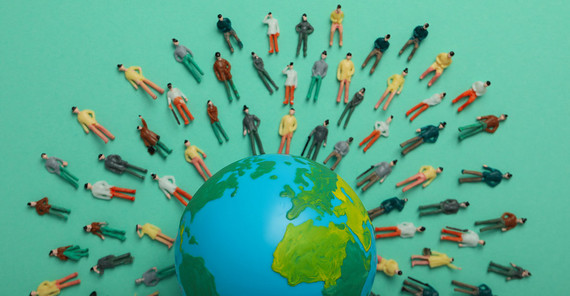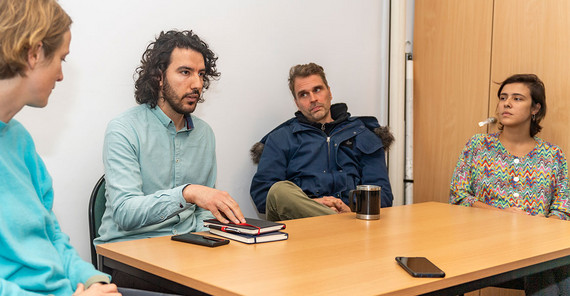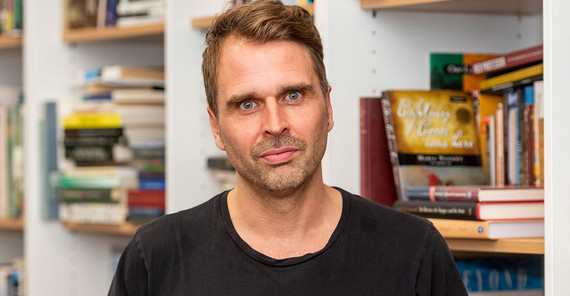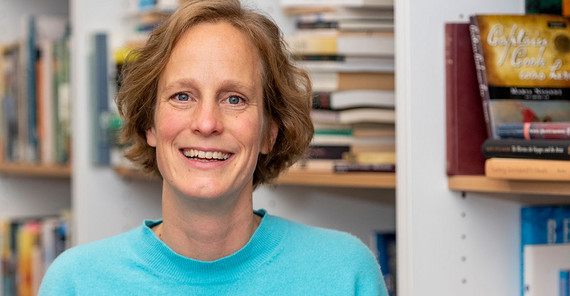In fact, the cosmopolitan idea is not new. 2,500 years ago, the Greek philosopher Diogenes of Sinope already called himself a citizen (polítes) of the world (kósmos), i.e. a cosmopolitan. He was one of the first to formulate this idea but definitely not the only one. In many places around the world, concepts of global togetherness emerged over the centuries based on the recognition that others are largely equal. But they all remained limited in their prominence in one way or another. The vision of a world community only became globally influential in the course of the Enlightenment through Immanuel Kant and others. And that is precisely the problem, the researchers of the RTG minor cosmopolitanisms stress. “The cosmopolitan ideal contains the big promise of universal rights for all people,” says Anja Schwarz. However, in reality these rights mainly applied to Europeans, white people, men. “People from many regions, with certain origins or genders were left out.” The RTG wanted to show that these people also live, produce, and communicate cosmopolitanism, albeit in niches, regionally or simply less prominently. In their research projects, the PhD students uncovered such often-buried evidence - in history, politics, culture, and science. Irene Hilden, for example, searched for the buried voices of imprisoned colonial soldiers from World War I in a prison camp near Berlin in the sound archive of Humboldt University. Anouk Madörin investigated films made by refugees on their way to Europe with their mobile phones. How do they experience flight and the European border regime? What images do they use for their cinematic self-documentation?
From criticism to alternative
The intention to focus on minor cosmopolitanisms was to achieve two things: On the one hand, to break up the monolithic portrait of the enlightened cosmopolitan and replace it with a kaleidoscope of practices. On the other hand, also to reveal the fraught history of the cosmopolitan idea. “At the turn of the millennium, cosmopolitanism was very much in vogue, especially in philosophy and sociology. But what was largely missing was a postcolonial perspective,” Eckstein explains. “In 2016, we wanted to show that the common ideal predominantly assumes and repeatedly reproduces a Western European tradition of knowledge that is intimately entangled with colonialism and imperial capitalism.” The goal was therefore not only an alternative concept to the illusion of an ideal world community but also fundamental criticism of the Enlightenment and its Eurocentric heritage.
Six years later, the world has changed. “All kinds of ethnic nationalisms are on the rise,” Schwarz says. “New walls are being erected and old borders are militarized across the fault lines of poverty, race, citizenship, and religion. The cosmopolitan idea is under attack.” Against this backdrop, the RTG is also redefining its goals – with its third generation of researchers. “In a world where it has become almost radical again to be a cosmopolitan in the sense of the Enlightenment, there is a greater need for critical alliances against the attacks from the right than for fundamental criticism,” Eckstein adds. But can the ideal of a world community be saved and critically questioned at the same time? How can people work together if they have the same goal but have grown up with opposing values? Can different cosmopolitan ideals be brought into dialogue with each other?
Together instead of alone
The PhD students trace different traditions in different discursive fields and look for existing or potential contact points. Like Mohammad Dalla, who is investigating how identity politics work when they are linked to sexual orientation and gender identity (SOGI). “I use case studies of asylum applications to examine how the identities of SOGI applicants are constructed within and perceived by the asylum system. In doing so, I also look at what effects this process has both inside and outside the asylum procedure,” he says. “I am also exploring alternative forms of resistance to the political and epistemic interventions of the West through which body, gender and sexuality are defined and governed. Ideally, this will allow me to show what solidarity with sexual and gender minorities can look like outside the Global North.”
In the coming years, a special focus will be on the ecological crisis, which has recently come to the fore with vehemence all over the world. Isadora Cardoso, for example, is doing a doctorate at Freie Universität and the RTG, and looks at initiatives fighting for climate protection in the Global South. “I focus on the often-marginalized voices and stories of queer, BIPoC and youth groups from the Global South that have historically been relegated to the sidelines of politics, including the fight for climate justice, and today often function only as an alibi.” The protest of Greta Thunberg and the “Fridays for Future” movement, which was accompanied by the media worldwide, has certainly achieved a lot. “But it is characterized by a Western-privileged perspective and ignores the connections between the climate crisis and (neo-)colonialism,” Cardoso says. This is a limitation that they want to break down. “In field studies, I will investigate discourses and practices of groups that approach climate justice from different contexts and positions.” Only then can climate protection also become climate justice. The goal is not to fight against each other, but with each other. And without blind spots. It is not without reason that Cardoso's project is called “One struggle one fight”.
Criticism connects
“That doesn’t mean that we are less critical,” Schwarz comments. “But being of a different opinion does not mean that you cannot pursue the same goal. The exchange with other traditions enriches the discourse and can change one’s own position. “For this, we have to listen to and also learn to understand each other.” Enabling dialogue and forging alliances is not only the declared goal of the RTG but also its method. “We insist on intensive exchange of all kinds,” Eckstein says. In lecture series, a summer school and the research lab, the PhD students come together in conversation, regardless of whether they are working on identity politics or climate protection. In addition, all of them spend an extended period at one of the cooperating universities and research institutions - ideally close to their topics. Like Isadora Cardoso, who wants to look at various initiatives locally. Incidentally, the RTG is also an invitation to a change of perspective and dialogue with regard to the academic world itself, Schwarz and Eckstein emphasize. “We believe that the university must constantly reflect on and expand the processes through which it produces knowledge,” Eckstein says. “To do this, we bring together as many different academic traditions as possible,” Schwarz adds. And not only these. Among the PhD students there are quite a few who are not only researchers but also artists or activists. Isadora Cardoso, for example, calls themselves a queer-feminist climate activist and researcher, Mohammad Dalla is not only a cultural scientist, but was also active in the Lesbian and Gay Association (LSVD) Berlin-Brandenburg and the Gunda Werner Institute of the Heinrich Böll Foundation for Feminism and Gender Democracy. “The Research Training Group can be a kind of machine that carries change into the academic system,” Schwarz hopes.
The Researchers
Prof. Dr. Lars Eckstein studied English, German, and Sports Science in Tübingen and the USA. Since 2009, he has been Professor of Anglophone Literatures and Cultures outside of Great Britain and the U.S. at the University of Potsdam.
E-Mail: lars.ecksteinuuni-potsdampde
Prof. Dr. Anja Schwarz studied cultural studies and did her doctorate in postcolonial studies. Since 2010, she has been Professor of British Cultural Studies at the University of Potsdam.
E-Mail: anja.schwarzuuni-potsdampde
Isadora Cardoso studied political science at the University of Brasilia as well as globalization and development studies at Maastricht University. Since 2022, they have been a PhD student in the Research Training Group minor cosmopolitanisms.
E-Mail: i.cardosoufu-berlinpde
Mohammad Dalla studied English literature and culture at the Damascus University and cultural sciences at the University of Potsdam. Since 2022, he has been a doctoral researcher in the Research Training Group minor cosmopolitanisms.
Email: mohammad.dalla.1uuni-potsdampde
The Project
Research Training Group minor cosmopolitanisms
Funding: German Research Foundation (DFG)
Duration: 2016–2025
Participating institutions: University of Potsdam (lead), Freie Universität Berlin, Humboldt-Universität zu Berlin
This text was published in the university magazine Portal Wissen - One 2023 „Learning“ (PDF).




